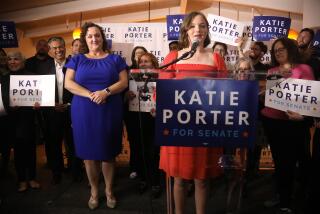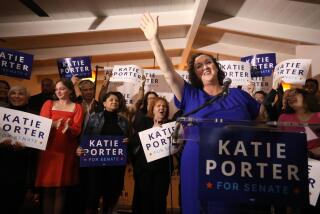Analysis: Hope for a less-partisan Congress in Supreme Court ruling
In last week’s Supreme Court decision affirming the right of citizens’ commissions to draw political districts, many California Democrats saw a lost opportunity to expand their ranks among the state’s elected officials.
One California Democrat, herself a former elected official, saw an opportunity gained.
Ellen O. Tauscher was elected to Congress seven times from the Bay Area, beginning in 1996. She built a record of bipartisan moderation before she joined the Obama administration in 2009 as undersecretary of state for arms control and international security.
Since her retirement a few years ago, she said, she has been approached repeatedly — at the grocery store, at cocktail parties — with the same frustrated complaint: Why is Congress so bad? What’s wrong with those people?
Her answer: It’s nothing a little redistricting magic can’t fix.
Tauscher argues that taking the drawing of congressional lines out of the hands of politicians will lead to more competitive districts. More competitive districts will mean more moderate House members. More moderate House members will mean more compromise on issues like campaign finance, and, more broadly, a lessening of the partisan gridlock that has frozen the Capitol in recent years.
The combination of more competition and less gridlock, she believes, will have the added benefit of engaging people so sick of the status quo that they often don’t bother to vote.
In effect, Tauscher’s suggesting that the rest of the country follow California’s lead. With two ballot measures in 2008 and 2010, the state put line-drawing in the hands of an independent commission, a move that increased the number of competitive seats. (Those measures were essentially endorsed Monday by the Supreme Court ruling, in an Arizona-based case.)
It’s not new territory for her; while in the House she introduced a bill calling for nonpartisan redistricting in all states.
“I couldn’t get myself arrested with that bill,” Tauscher said, “and if I was speaking and on fire no one would have thrown water on me.”
Attempts in recent months to push for redistricting changes outside California have been thwarted by concerns that the Supreme Court would invalidate the commission approach. As of Monday, that concern had vanished. By Tuesday, Tauscher had the beginnings of a website — www.youdrawthelines2021.org — outlining her approach.
She’s not shy about calling the current situation a “constitutional crisis,” in the sense that in many districts one party so controls the seat that only its voters matter.
“The founding fathers...did not foresee that it would be possible to create congressional districts and assign them to parties where the person in the seat is fungible and the party owns that seat for 10 years during the time between redistrictings,” she said. “That’s why I think you have such tremendous voter apathy, why you have people believe their vote doesn’t matter and the sense that it’s all rigged.”
But playing to apple-pie sentiments won’t be enough. In California, taking redistricting power from the Legislature hurt Democrats. Elsewhere, it stands to hurt Republicans, who will be only too happy to cast Tauscher’s effort in highly partisan terms.
“This will be a nonpartisan effort, of people who are from both parties,” she said. “I am a dyed-in-the-wool Democrat. I do things that are very partisan. Certainly I’m a big supporter of Hillary Clinton. I’m also capable of being a modern patriot who wants a country that actually works.”
There is another obvious problem: How to make voters snap to attention over an issue that even Tauscher acknowledges is dull, dull, dull.
It can be exceptionally difficult. California’s 2014 secretary of state race featured a candidate making a similar tough sell, in that case to tighten the state’s fundraising and ethics rules.
The candidate, Dan Schnur, finished fourth in the primary. Added insult: he ended up just behind former state Sen. Leland Yee, who had been indicted two months earlier on corruption charges (Yee pleaded guilty last week to racketeering).
“Redistricting is the single least interesting word in the English language,” said Schnur, a former chief of the state’s Fair Political Practices Commission, adding that the challenge “is getting the average voter to pay attention.”
“Normal people tend to spend a lot more time thinking about schools and jobs and crime and healthcare and not quite as much time on how congressional and legislative districts are drawn,” said Schnur, director of USC’s Jesse M. Unruh Institute of Politics. “Very few people care all that much about how campaigns are financed or who creates political boundaries, so you have to convince them that these incredibly arcane reforms can lead to better outcomes on the real-world concerns they do care about.”
Undeterred, Tauscher said that soon she will begin rolling out endorsements by Republicans, Democrats and good-government groups and raising the tens of millions of dollars she expects the effort will require.
The immediate targets are a number of key states where she hopes voters can be persuaded to embrace the commission format or, alternately, expand the commissions they already have. About 20 states have adopted some redistricting changes, but Tauscher said she will emphasize big states whose support would create momentum.
She doesn’t expect immediate improvements in voter behavior — it certainly hasn’t happened in California, a persistently bad actor when it comes to turnout. But she is hopeful that over time, voters will respond to a changed Congress.
“We are going to put paddles on Congress’ chest and we’re going to jump start it, and get it going, and ... move it forward to where we think it needs to be,” she said.
Twitter: @cathleendecker. For more on politics, go to https://www.latimes.com/decker.
More to Read
Start your day right
Sign up for Essential California for news, features and recommendations from the L.A. Times and beyond in your inbox six days a week.
You may occasionally receive promotional content from the Los Angeles Times.






